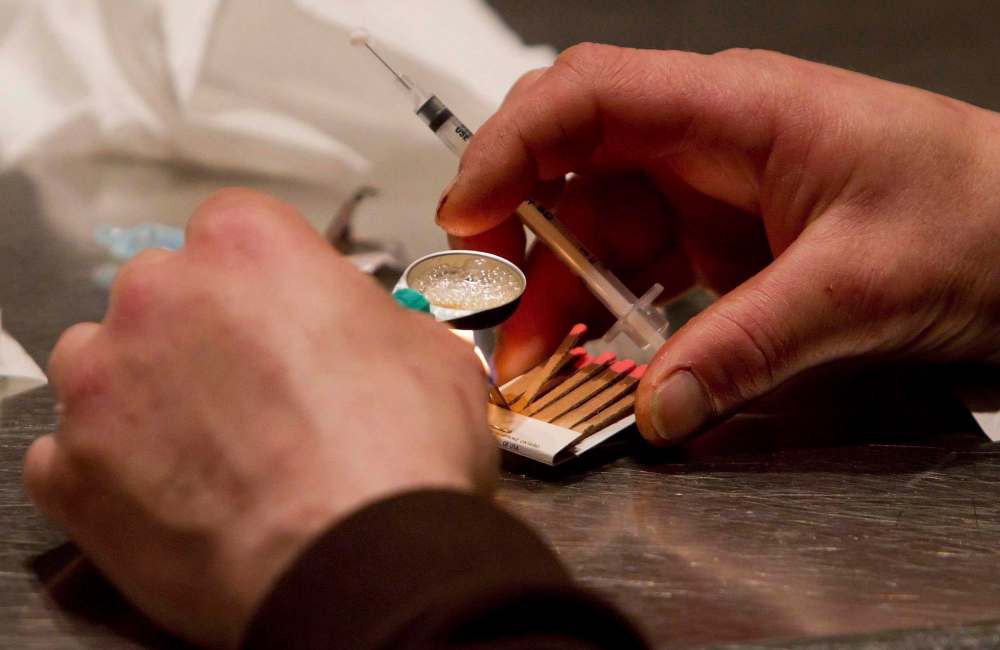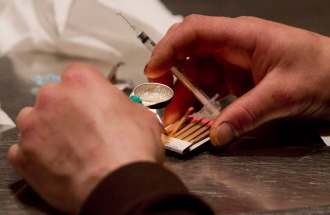Surge in Manitoba opioid deaths renews call for safe injection sites
Read this article for free:
or
Already have an account? Log in here »
To continue reading, please subscribe:
Monthly Digital Subscription
$19 $0 for the first 4 weeks*
- Enjoy unlimited reading on winnipegfreepress.com
- Read the E-Edition, our digital replica newspaper
- Access News Break, our award-winning app
- Play interactive puzzles
*No charge for 4 weeks then billed as $19 every four weeks (new subscribers and qualified returning subscribers only). Cancel anytime.
Read unlimited articles for free today:
or
Already have an account? Log in here »
Hey there, time traveller!
This article was published 18/06/2018 (2138 days ago), so information in it may no longer be current.
Someone died from an opioid-related overdose every three days in Manitoba last year, according to new government data released Tuesday.
Nearly 4,000 Canadians died from apparent opioid overdoses in 2017, an increase of 34 per cent from the previous year. Manitoba’s opioid-related overdose deaths rose in lockstep with the rest of the country, shooting up to 122.
“We are seeing an unprecedented number of opioid-related overdoses in Canada. This national public health crisis continues to devastate Canadians from all walks of life, in both rural and urban areas,” said a statement from the co-chairs of the federal government’s special advisory committee that produced the report.

Of the 122 deaths in Manitoba, 86 were characterized as accidental, up from 70 in 2016. Just under half (49 per cent) of the accidental overdose deaths involved fentanyl or a fentanyl analogue. The majority of Manitoba’s deaths (72 per cent) were men, with people aged 20 to 39 (59 per cent) the most likely to die.
The numbers didn’t come as a surprise to Marion Willis, founder and director of St. Boniface Street Links, a frontline service which helps men battling addiction get off the streets. Not only was she not surprised, but Willis said the situation – and those numbers – is likely to worsen in coming years.
“We have a growing problem in this province, not unlike other provinces. The drug culture has really taken over (Winnipeg) and Brandon, and I’m sure other locations in Manitoba. It’s going to get a whole lot worse, I would suggest. If we’re rejecting the types of strategies that work well when we have one of the greatest drug crises we’ve ever faced, it can only get worse," Willis said.
Willis is a part of a significant number of frontline workers who say the city needs a supervised injection site to help reduce opioid-related deaths. She says the data is clear: the facilities save lives.
A supervised injection site would form a crucial point of access for people battling addiction, and – ideally – would be the first step in a comprehensive continuum of care, she added.
“The situation is really dire and the help isn’t there. Harm reduction is a critical first step. Every major city that’s dealing with what we’re dealing with understands safe injection is the best practice. So why would that not be the best practice for Winnipeg?” Willis said.
A spokesman for Health Minister Kelvin Goertzen said he was unable to comment on the matter Tuesday, given the media blackout rules triggered by the pending St. Boniface by-election set for July 17. In the past, Goertzen has said he doesn’t consider a supervised injection site to be the best use of the province’s resources.
When reached for comment, a provincial spokeswoman pointed to the government’s recent announcement of the creation of Rapid Access to Addictions Medicine (RAAM) clinics, saying they will help reduce opioid overdose deaths.
In May, Goertzen announced the creation of five provincially-funded RAAM clinics, two of which are slated to be built in Winnipeg. Modeled on existing facilities in Ontario, the clinics will aim to provide patients with initial addictions care while connecting them with specialists and other longer term support.
!function(e,t,n,s){var i=”InfogramEmbeds”,o=e.getElementsByTagName(t)[0],d=/^http:/.test(e.location)?”http:”:”https:”;if(/^/{2}/.test(s)&&(s=d+s),window[i]&&window[i].initialized)window[i].process&&window[i].process();else if(!e.getElementById(n)){var a=e.createElement(t);a.async=1,a.id=n,a.src=s,o.parentNode.insertBefore(a,o)}}(document,”script”,”infogram-async”,”https://e.infogram.com/js/dist/embed-loader-min.js”);
Supervised injection sites, meanwhile, are controlled settings where people can inject illicit drugs. While the drugs themselves are not sold at the site, clean injection equipment, information about drugs and health care, access to medical staff and treatment referrals, among other things, are provided.
Willis believes the RAAM clinics are an insufficient solution to the current crisis, making her question whether the provincial government really grasps how bad the situation is.
“The RAAM clinics are this health minister’s fix for the drug crisis we’re dealing with. It’s not a fix at all. Are they ill-informed? Or are they just too old school? I think they believe safe injection is giving people permission to use,” Willis said.
“People are using either way, it’s about creating a controlled environment and a point of access to further care. It’s also a public safety matter. Would people rather see a drug user shooting up on an inner-city playground where your child goes to school and might pick up a dirty needle?”
One of the lone bright spots of Tuesday’s report is news that daily doses of opioids prescribed across the country fell 10 per cent from 2016 to 2017, down to 21.3 million doses prescribed per day.
In response to the growing epidemic, Health Canada announced Tuesday it was creating new restrictions that will soon be in place against the marketing of opioids. In the meantime, the health authority has asked opioid manufacturers to stop all marketing of the drugs while the new regulations are created.
ryan.thorpe@freepress.mb.ca
Twitter: @rk_thorpe
Manitoba stats for 2017
Total opioid-related overdose deaths:
122
Accidental opioid-related overdose deaths:
86
Accident opioid-related deaths involving fentanyl or a fentanyl analogue:
42
72 per cent of deaths were men
59 per cent of deaths were people aged 20 to 39

Ryan Thorpe
Reporter
Ryan Thorpe likes the pace of daily news, the feeling of a broadsheet in his hands and the stress of never-ending deadlines hanging over his head.








